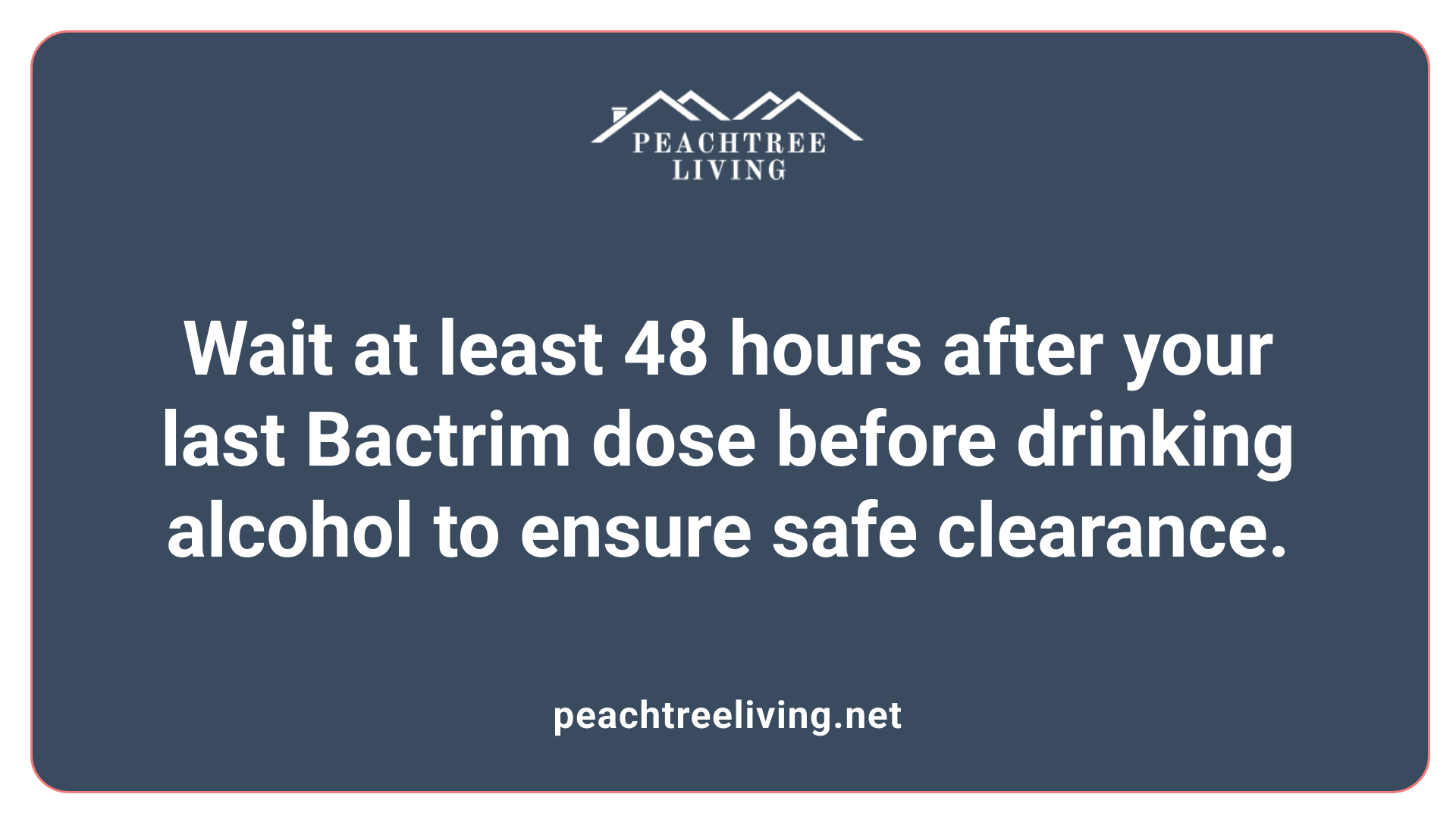An Essential Guide for Patients on Bactrim
Bactrim, a commonly prescribed antibiotic composed of sulfamethoxazole and trimethoprim, is effective against various bacterial infections. However, when it comes to alcohol consumption during Bactrim treatment, caution is highly advised. This article explores the medical implications, potential side effects, and safety tips to ensure optimal recovery and health.
The Interaction Between Bactrim and Alcohol: Why Caution Is Necessary

Why is alcohol often discouraged during antibiotic treatment like Bactrim?
Many healthcare providers advise against drinking alcohol while taking Bactrim (sulfamethoxazole and trimethoprim) because combining the two can lead to uncomfortable and potentially serious side effects. Alcohol can upset your stomach, causing nausea and vomiting, which are already common side effects of Bactrim.
Furthermore, alcohol can cause a disulfiram-like reaction when mixed with Bactrim. This reaction might include symptoms like facial flushing, nausea, vomiting, low blood pressure, rapid heartbeat, and sweating. Such reactions can be dangerous and uncomfortable.
Alcohol also impacts the liver’s ability to process medications. Bactrim is metabolized partly by the liver, and alcohol can interfere with this process, leading to increased levels of the drug in your body. This can heighten the risk of liver damage and other side effects.
Additionally, alcohol can weaken your immune system, making it harder for your body to recover from infection. It can also impair recovery by causing dehydration, digestive disturbances, and impairing your overall immune response.
Given these risks, many healthcare professionals recommend avoiding alcohol altogether during Bactrim treatment. Waiting at least 48 hours after your last dose of Bactrim before consuming alcohol helps ensure the medication has cleared your system, reducing potential side effects.
Effects of alcohol on Bactrim’s metabolism and effectiveness
Alcohol can interfere with how the liver breaks down Bactrim, potentially causing the medication to stay longer in your system than intended. This increases the risk of side effects such as nausea, dizziness, and liver strain.
Moreover, alcohol’s immune-suppressing effects may reduce the effectiveness of Bactrim in fighting off the bacterial infection. The immune system plays a crucial role in recovery, and alcohol can hinder this process, leading to prolonged illness or increased risk of complications.
The interaction might also impact other medications you’re taking, compounding the side effects. For example, combining alcohol with certain antibiotics like linezolid can cause dangerous blood pressure spikes.
Risks of liver and kidney damage from combined use
Both Bactrim and alcohol put stress on your liver and kidneys. Bactrim can cause liver toxicity or damage, especially in people with preexisting liver conditions. Alcohol exacerbates this risk by impairing liver function and increasing the workload on these vital organs.
The combined strain from alcohol and Bactrim can lead to liver and kidney damage, which in severe cases might require medical intervention or hospitalization. This is particularly true if alcohol is consumed excessively or regularly during treatment.
In summary, avoiding alcohol while on Bactrim helps prevent disulfiram-like reactions, reduces the risk of liver and kidney damage, and ensures that your antibiotics work effectively to help you recover.
| Aspect | Effect | Additional Details |
|---|---|---|
| Side effects | Nausea, vomiting, flushing, rapid heartbeat | Increased when combined with alcohol |
| Liver impact | Increased risk of liver damage | Alcohol and Bactrim both strain liver functions |
| Immune function | Impaired recovery | Alcohol weakens immune response |
| Timing | Wait at least 48 hours | To allow the medication to clear |
| Precaution | Avoid alcohol during treatment | To minimize adverse reactions |
In conclusion, caution with alcohol during Bactrim treatment is essential for safety and maximum effectiveness. Always follow your healthcare provider’s advice and inform them of any alcohol consumption.
Why Avoid Drinking Alcohol While on Bactrim?

Potential adverse reactions
Mixing Bactrim (sulfamethoxazole / trimethoprim) with alcohol can cause a range of unpleasant side effects. One notable reaction is similar to a disulfiram-like response, which may include symptoms such as facial flushing, nausea, vomiting, low blood pressure, dizziness, and a rapid heartbeat. Additionally, alcohol can exacerbate common side effects of Bactrim, such as stomach upset, nausea, vomiting, diarrhea, and dizziness. In some cases, it can also lead to more severe outcomes like skin reactions or liver and kidney damage, especially if consumed in large amounts.
Impact on immune system and recovery
Alcohol has the potential to weaken your immune system, making it harder for your body to fight off infection while on Bactrim. Drinking alcohol during your antibiotic course can slow down your recovery process and impair overall health. It can also increase the risk of dehydration and reduce your body’s ability to respond effectively to treatment, leading to prolonged illness.
Delay in medication clearance
Bactrim affects how your liver metabolizes alcohol, which can interfere with the body’s ability to eliminate alcohol efficiently. This interference can result in higher concentrations of alcohol in your bloodstream for longer periods, increasing the likelihood of adverse effects. It’s generally advised to wait at least 48 hours after your last dose of Bactrim before consuming alcohol. This waiting period helps ensure the medication is mostly cleared from your system, reducing the risk of dangerous reactions.
Can I safely drink alcohol while taking Bactrim?
It is best to avoid alcohol while on Bactrim. Drinking can increase the risk of side effects such as stomach upset, dizziness, nausea, vomiting, flushing, headache, and an increased heart rate. While Bactrim is not among the antibiotics most strongly linked to severe reactions with alcohol, the potential for discomfort and health complications remains significant.
To stay safe, clinicians usually advise abstinence from alcohol during the entire course of treatment and until you fully recover. Always check with your healthcare provider for advice tailored to your specific situation, especially if you have underlying health conditions or are taking other medications.
Potential Side Effects of Drinking Alcohol While on Bactrim

What are the potential side effects of drinking alcohol while on Bactrim?
Consuming alcohol during Bactrim treatment can lead to a variety of adverse effects. Patients may experience an increase in nausea, dizziness, headaches, and stomach pain. These symptoms can become more severe when alcohol is added, intensifying discomfort and dehydration.
Moreover, alcohol can interfere with how Bactrim is processed in the liver. Since both substances can impair liver function, their combination raises the risk of liver damage or exacerbation of existing liver issues. This can hinder the body's ability to clear the medication effectively, reducing its ability to treat infections properly.
In addition to these issues, drinking alcohol while on Bactrim can trigger a disulfiram-like reaction. This reaction involves symptoms such as an excessively rapid heartbeat, facial flushing, low blood pressure, and chest tightness. While not common, such reactions can be serious and necessitate immediate medical attention.
Healthcare providers strongly recommend avoiding alcohol while on Bactrim. If alcohol consumption can't be avoided, it should be limited and done with caution, ideally after consulting a healthcare professional. Waiting at least 48 hours after completing Bactrim treatment before drinking alcohol helps minimize these risks.
How Long Should I Wait After Bactrim Before Drinking Alcohol?

Recommended waiting period
It is generally recommended to wait at least 24 hours after your last dose of Bactrim before consuming alcohol. This waiting period helps ensure that the medication has been adequately cleared from your system, reducing the chances of adverse interactions.
Why waiting is important
Bactrim can interfere with the way your liver metabolizes alcohol. Mixing the two can lead to a disulfiram-like reaction, which includes symptoms like flushing, nausea, vomiting, low blood pressure, and an increased heartbeat. Additionally, both Bactrim and alcohol can cause common side effects such as stomach upset, dizziness, and drowsiness.
More serious effects could involve liver or kidney damage, especially if alcohol is consumed while Bactrim is still active. Since alcohol can also weaken your immune response, it may impair your recovery from infection. Therefore, giving your body enough time to process the medication is crucial.
Signs of medication clearance
While the typical guideline suggests waiting 24 hours, some sources recommend extending this to 48 hours to be extra cautious. Watch for signs that the medication has been cleared — such as the disappearance of any side effects related to Bactrim. If you experience any unusual symptoms or have doubts, consult your healthcare provider for personalized advice.
In summary, to minimize health risks and ensure effective healing, it is best to wait until at least 24 hours after finishing Bactrim before drinking alcohol. If you have any concerns or experience side effects, seek medical guidance to determine the right timing for you.
Medical Implications and Safety Considerations
Why is it important to follow medical guidance regarding alcohol consumption during Bactrim treatment?
Following medical guidance while taking Bactrim is crucial because combining it with alcohol can cause serious health issues. Bactrim and alcohol both put strain on the liver, and when taken together, they can interfere with how the liver processes these substances. This can lead to increased risk of liver and kidney damage.
Additionally, alcohol can impair the immune system, making it harder for your body to fight off infections. This effect can prolong recovery and reduce the effectiveness of the antibiotic. Some reactions, such as a disulfiram-like response, can lead to symptoms like nausea, flushing, rapid heartbeat, and low blood pressure.
Healthcare providers generally advise avoiding alcohol entirely during Bactrim treatment. This helps to prevent adverse side effects and ensures the medication works properly. In cases where alcohol has been consumed accidentally, or if there are concerns, consulting a healthcare provider is essential for proper guidance and monitoring.
Waiting at least 48 hours after your last dose of Bactrim before drinking alcohol is generally recommended, as the drug can stay in your system for some time. Observing these precautions supports a safer recovery process and reduces risks of complications. Always seek personalized advice from your healthcare professional for the best course of action.
Summary and Practical Advice for Patients
Key takeaways
Mixing Bactrim (sulfamethoxazole / trimethoprim) and alcohol should generally be avoided. Alcohol can interfere with how your liver breaks down Bactrim, leading to increased side effects, including nausea, vomiting, and flushing. It might also diminish the medication’s effectiveness, prolonging your illness.
Combining these substances can cause a disulfiram-like reaction, which involves symptoms such as sweating, low blood pressure, rapid heartbeat, and facial flushing. Serious side effects like liver and kidney damage are also possible.
When to abstain from alcohol
It is highly recommended to avoid alcohol during the course of Bactrim treatment. The safest approach is to wait at least 48 hours after your last dose before drinking any alcohol. This waiting period helps ensure the medication has cleared your system, reducing the risk of adverse reactions.
Some healthcare providers suggest not drinking at all while on Bactrim, as even small amounts can cause unpleasant effects or interfere with recovery. If you choose to drink, consult your doctor for personalized advice.
Consulting healthcare professionals
Always discuss alcohol use with your healthcare provider when prescribed Bactrim. They can advise you on safe timing for drinking, particularly if you have liver or kidney issues or other health concerns.
In case of accidental alcohol intake during medication, seek medical advice promptly. Clear guidance from your healthcare professional helps ensure your safety and the effectiveness of your treatment.
| Aspect | Advice | Additional Notes |
|---|---|---|
| Safe waiting period | Wait at least 48 hours post-treatment | Longer if advised by your doctor |
| Symptoms of adverse reactions | Watch for nausea, flushing, or rapid heartbeat | Seek medical attention if these occur |
| Alcohol with other antibiotics | Avoid or consult your doctor | Some antibiotics interact dangerously with alcohol |
| Long-term effects | Minimize alcohol to protect liver health | Alcohol and Bactrim both impact liver |
Being cautious with alcohol during Bactrim treatment can help avoid complications, ensuring a smoother recovery and better health outcomes.
Final Thoughts on Bactrim and Alcohol
Given the potential risks and lack of strong evidence supporting safe concurrent use, it is best to avoid alcohol during Bactrim therapy. Waiting at least 24 to 48 hours after the last dose is advisable before consuming alcohol. Always seek advice from your healthcare provider to tailor recommendations to your individual health status and ensure effective treatment and swift recovery.
References
- Can I Drink Alcohol With Sulfa Antibiotics Like Bactrim? - GoodRx
- Antibiotics and alcohol - Mayo Clinic
- Fact versus Fiction: a Review of the Evidence behind Alcohol and ...
- Bactrim and Alcohol: Interactions & Side Effects - Ascendant New York
- Bactrim and Alcohol - Northstar Behavioral Health
- 4 Foods and Drinks to Avoid While on Sulfamethoxazole ... - GoodRx
- Bactrim & Alcohol: Risks, Side Effects, And For Safe Medication Use.

